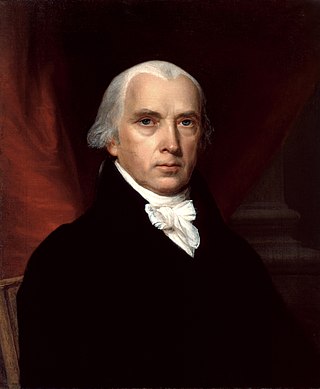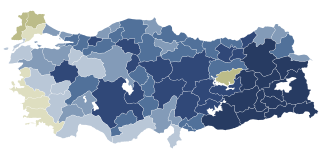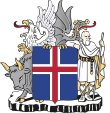
Presidential elections were held in the United States on November 5, 1996. Incumbent Democratic President Bill Clinton and his running mate, incumbent Democratic Vice President Al Gore were re-elected to a second and final term, defeating the Republican ticket of former Senate Majority Leader Bob Dole and former Secretary of Housing and Urban Development Jack Kemp and the Reform ticket of businessman Ross Perot and economist Pat Choate.

Presidential elections were held in the United States from October 30 to December 2, 1812. In the shadow of the War of 1812, incumbent Democratic-Republican President James Madison defeated DeWitt Clinton, the lieutenant governor of New York and mayor of New York City, who drew support from dissident Democratic-Republicans in the North as well as Federalists. It was the first presidential election to be held during a major war involving the United States.

The politics of Iceland take place in the framework of a parliamentary representative democratic republic, whereby the president is the head of state, while the prime minister of Iceland serves as the head of government in a multi-party system. Executive power is exercised by the government. Legislative power is vested in both the government and the parliament, the Althingi. The judiciary is independent of the executive and the legislature.

The president of Iceland is the head of state of Iceland. The incumbent is Halla Tómasdóttir, who won the 2024 presidential election.

Ólafur Ragnar Grímsson is an Icelandic politician who was the president of Iceland from 1996 to 2016. He was previously a member of the Icelandic Parliament for the People's Alliance and served as Minister of Finance from 1988 to 1991.

The 1996 United States Senate elections were held on November 5, 1996, with the 33 seats of Class 2 contested in regular elections. Special elections were also held to fill vacancies. They coincided with the presidential election of the same year, in which Democrat Bill Clinton was re-elected president.
The coattail effect or down-ballot effect is the tendency for a popular political party leader to attract votes for other candidates of the same party in an election. For example, in the United States, the party of a victorious presidential candidate will often win many seats in Congress as well; these Members of Congress are voted into office "on the coattails" of the president.

General elections were held in American Samoa on November 4, 2008, to elect a governor, members of the House of Representative, and a delegate to the United States House of Representatives, as well as a referendum on a legislative override of the governor's veto. The elections were held as part of the wider 2008 United States general election.
Presidential elections were held in Iceland on 29 June 1996. The result was a victory for Ólafur Ragnar Grímsson, who received 41.4% of the vote.

A constitutional referendum on electoral reform was held in Turkey on 21 October 2007. After the aborted attempt to elect the next president in May 2007, the government of Recep Tayyip Erdoğan introduced substantial electoral reforms in parliament which were then passed with the votes of Erdoğan's Justice and Development Party and the opposition Motherland Party.
Presidential elections were planned to be held in Iceland on 28 June 2008.

The 1996 United States presidential election in Georgia took place on November 5, 1996, as part of the 1996 United States presidential election. Voters chose 13 representatives, or electors to the Electoral College, who voted for president and vice president.
Presidential elections were held in Iceland on 30 June 2012. The result was a victory for the incumbent Ólafur Ragnar Grímsson, who defeated his nearest rival Thóra Arnórsdóttir by nearly 20% of the vote, and went on to serve a record fifth term as president of Iceland.
Presidential elections were scheduled to be held in Iceland in 2000. However, incumbent president Ólafur Ragnar Grímsson was the only candidate and the election was uncontested.
Ástþór Magnússon Wium is an Icelandic businessman and peace activist, who is best known for being the founder of the first credit card company in Iceland and as a perennial candidate for the office of President of Iceland.
The following lists events that happened in 2010 in Iceland.
Presidential elections were held in Iceland on 25 June 2016. President Ólafur Ragnar Grímsson, elected in 1996, stepped down after serving five consecutive terms. The history professor Guðni Th. Jóhannesson was elected after receiving a plurality of 39.1% of the vote. He took office on 1 August, as the first new president of Iceland in twenty years.
Baldur Ágústsson is an Icelandic businessman, who ran for president of Iceland in 2004 and 2016.
Guðrún Agnarsdóttir is an Icelandic politician and physician. She served in the Alþingi from 1983 to 1990 as a member of the Women's List, and ran for the presidency of Iceland in 1996. She was CEO of Iceland's cancer society from 1992 to 2009, when she retired to spend time with her family and to continue farming forests.
Guðmundur Franklín Jónsson, is an Icelandic businessman and former politician who was known to be a presidential candidate in the 2020 Icelandic presidential election.











